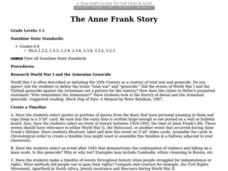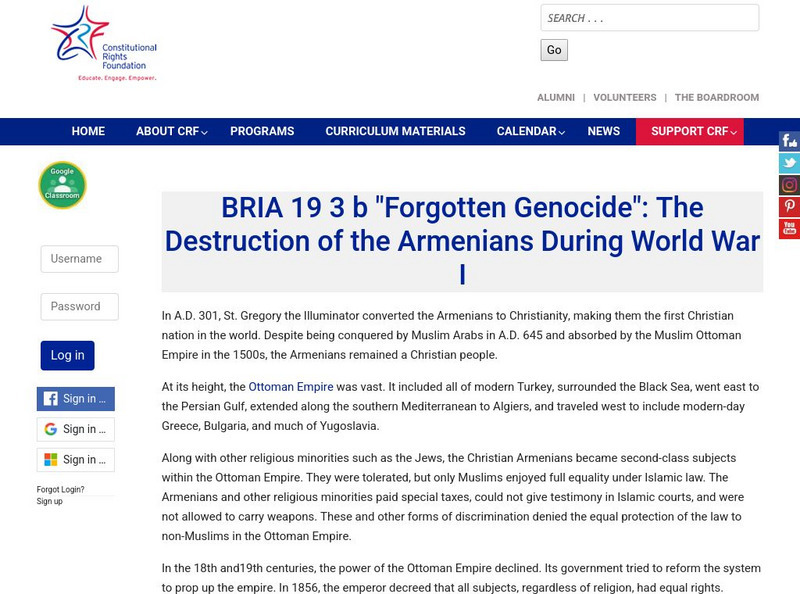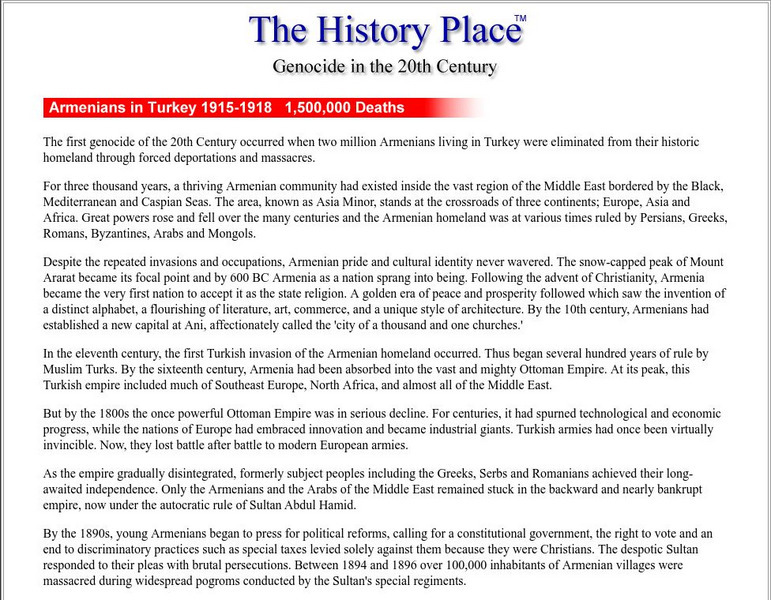Mountain View High School
World War I Research Project
Here is a fantastic World War I research project that includes clear guidelines for topic choice, guiding questions, and suggested presentation products. Research subjects range from battles of the war, trench warfare, and weaponry, to...
Curated OER
The Roots of the Arab-Israeli Conflict: 1890s-1947
Consider and examine the roots of the Arab-Israeli conflict during the turn of the century. The topics covered in this presentation are not fully explained but are a perfect accompaniment to a full lecture. Issues to examine include The...
Curated OER
1914-1918: The World at War
Thorough and engaging, this presentation details the causes and contexts of World War I on all fronts. It covers "the spark" that began it all, as well as the effect of technology on weaponry and the role of women on the home front and...
Curated OER
The Anne Frank Story
What is genocide? Create timelines regarding the human genocide. Middle and high schoolers analyze information that requires them to consider links between Armenian genocide and the Holocaust. In groups, theydesign timelines that...
Facing History and Ourselves
Identity and Belonging
High schoolers examine World War I war crimes. For this world history activity, students examine a painting by Ashile Gorky, a refugee from the Armenian genocide. High schoolers interpret the piece of art and discuss its historical...
Facing History and Ourselves
We and They, the Armenians in the Ottoman Empire
Learners examine World War I war crimes. For this world history instructional activity, high schoolers use primary and secondary sources to research and understand the action taken by the United States during the Armenian Genocide....
Facing History and Ourselves
The Range of Choices
Learners examine crimes against human rights. In this world history instructional activity, students watch a segment of a video about the Armenian Genocide. Learners reflect on the crimes of the Ottoman government in classroom...
Facing History and Ourselves
What is Justice After Genocide?
Students explore the meaning and implications of genocide. In this human rights lesson plan, students investigate the Aremenian genocide that took place in Turkey and the subsequent trials of the leader of the genocide held by the...
Facing History and Ourselves
American Responses to the Armenian Genocide
Young scholars examine World War I war crimes. In this world history instructional activity, students use primary and secondary sources to research and understand the action taken by the United States during the Armenian Genocide. Young...
Facing History and Ourselves
Analyzing Historical Evidence
High schoolers examine World War I war crimes. In this world history instructional activity, students use primary and secondary sources to research and understand the systematic nature of the Armenian Genocide. High schoolers reflect on...
Facing History and Ourselves
Denial and Free Speech
Learners explore the meaning and implications of genocide. For this Armenian genocide activity, learners investigate the genocide that took place in Turkey.
Curated OER
The Armenian Genocide: The American Ambassador in Constantinople
Students analyze America's reaction to the Armenian Genocide. They write a journal response, read and discuss text, compare/contrast reactions around the world to the Armenian Genocide and the genocide in Rwanda, and write an essay.
Curated OER
Armenian Genocide
As your historians examine the beginnings of WWI, ensure they are familiar with the Armenian Genocide. This basic introductory lesson plan utilizes teacher-led discussion, map analysis, and a Socratic seminar. Not much detail is offered...
Other
The Faith of the Armenian Church
This site examines Christology from the Armenian perspective. It is interesting to note the major differences between the Armenian Christology and that of the Roman Catholic Church concerning "Earthly Religious Authority".
Constitutional Rights Foundation
Constitutional Rights Foundation: The Destruction of the Armenians During World War I
Activity-based resource on the genocide and mass deportation of Armenians from Turkey during WWI. Students investigate whether the treatment of Armenians by the Turkish governmnet fits the definition included in the UN Genocide Convention.
The History Place
The History Place: Armenians in Turkey 1915 1918
The first genocide of the 20th Century occurred when two million Armenians living in Turkey were eliminated from their historic homeland through forced deportations and massacres.
Other
Genocide Education Project: Armenian Genocide Resource Library for Teachers
Resources for teaching about genocide, particularly the Armenian genocide.
CommonLit
Common Lit: Excerpt From My Mother's Voice: The Proclamation
CommonLit.org is a wonderful resource to use in a Language Arts classroom. Each story or article is accompanied by guided reading questions, assessment questions, and discussion questions. In addition, students can click on words to see...
Other
Armenian History
A very comprehensive look at Armenian history written by an Armenian so expect some partiality. Use the table of contents to navigate the site. Pictures illustrate every section and a glossary is included.
Other
Armenian History
A very comprehensive look at Armenian history written by an Armenian so expect some partiality. Use the table of contents to navigate the site. Pictures illustrate every section and a glossary is included.





















